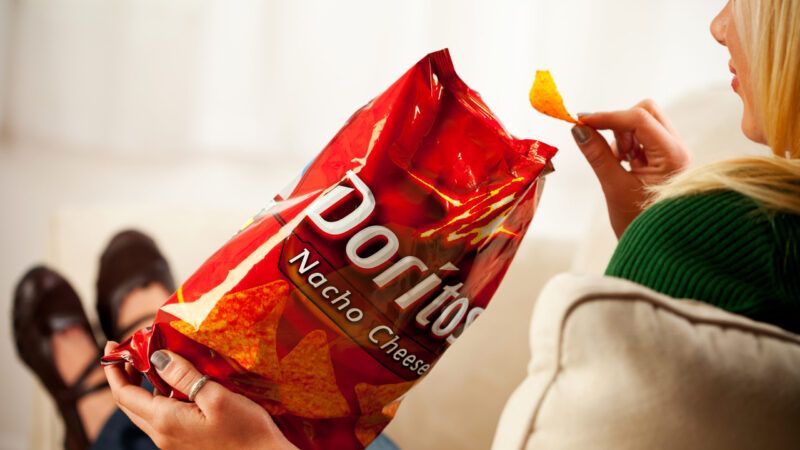A High School Banned Students From Selling Snacks. Predictably, a Black Market for Snacks Emerged.
A sociologist spent 112 days tracking students' illicit deals for chips and other goodies.

When Carlos got pinched by the fuzz, he was holding some hot commodities.
Flaming hot, in fact.
No, that's not slang. The illegal behavior that landed Carlos (not his real name), a ninth-grade student at a high school in the southern suburbs of Chicago, in the deans' office on a mid-September morning in 2019 was the illicit sale of chips to one of his fellow students. For the crime, he was summarily sentenced to a one-day suspension from school—and his mother was called to pick him up.
As Karlyn Gorski, a doctoral candidate in sociology at the University of Chicago, relates in a paper recently published in the journal Youth & Society, Carlos is just one small part of a robust black market for snack foods that persists at Hamilton High (not the school's real name) despite the best efforts by school administrators, security guards, and teachers to stamp it out. The punishment handed out to Carlos for his busted chip-deal was actually a light sentence, Gorski explains, with administrators granting leniency on the grounds that Carlos was a freshman and might not yet understand the school's zero-tolerance policy for unapproved exercises of snack-related capitalism. Repeat offenders, she writes, faced in-school suspensions—the high school equivalent of solitary confinement.
Gorski spent 112 days observing students and adults at Hamilton during the 2019–2020 school year, though her research was cut short by the school's closure due to the COVID-19 pandemic. While there, she observed a widespread black market for snack sales. The perpetrators were mere children, but they organized "elaborate strategies to hide sales, build networks of sellers, and develop a verbal shorthand around the market."
By outlawing the sale of snacks, the school ensured that only outlaws would sell snacks.
Enforcement of the snack-selling ban was robust, with security guards even relying on the use of mounted cameras to identify perpetrators so they could be hauled out of class and reprimanded.
"I had to go get him out of class, send him to the dean, do the whole thing," one security guard—pseudonymously monikered "Karen"—told Gorski. Punishing a student for a victimless crime was apparently more important than whatever he might have learned in class that day.
But beyond the amusing anecdotes about deception and the heroic struggles of would-be entrepreneurs against the school snack cops, the paper contains some serious implications about what the school is teaching its students. "Adult responses to youth behaviors can produce a stigma of deviance around activities that, in other contexts, are permitted or even lauded," Gorski explains.
Within the school environment, not all snack sales were illicit. Students in a Spanish club selling cookies to raise money for a field trip to Peru were allowed to "carry their wares openly and advertise on posters throughout the school," writes Gorski. "Sellers working for their own gain did not have the luxury of such promotion. When the profits of snack sales benefitted organizations that fell under the school's purview, they were lauded; the school retained control over the proceeds, ensuring the money went to something 'worthy.'"
By contrast, when students were caught "selling" by teachers and administrators, their motives were "subject to moral scrutiny," writes Gorski, who described an incident in which one teacher told a student that selling snacks to fund the purchase of a new pair of shoes was a "poor use" of resources.
The students at Hamilton, a majority of whom are minorities and roughly 80 percent from low-income households, had no trouble deconstructing the school's unequal treatment of the same economic activities. One student, code-named Lucas, told Gorski that "they're basically training us for a fake world" in which good behavior is rewarded while trying to make a buck is regarded as valuable only if the seller's intentions are worthy.
"Adults thus undermined their own disciplinary apparatus by demonstrating its unfairness," concludes Gorski. "With consequences so irregularly applied, and the activities they aimed to prohibit so mandate…it made more sense to disregard the prohibition and enjoy the rewards of buying and selling treats."
The high school snack policies that are the subject of Gorski's paper form an eerily effective microcosm of similar arrangements in other parts of the world. Prohibition, which banned the serving of alcohol in the United States for more than a decade in the early 20th century, produced a black market that kept the booze flowing to those who had access to the necessary money and connections. Drug prohibition has produced many of the same outcomes.
Gorski points to an even more pernicious parallel: prisons, where the passing of illegal goods ranging from cigarettes to hard drugs is similarly handled via a black market. Indeed, the government can't even keep drugs out of prisons—how could the drug war be anything but a failure everywhere else?
Still, treating innocuous behavior as criminal forces students to behave more like criminals in order to continue engaging in the market. Those patterns are the opposite of what schools should be teaching.
"Through their disciplinary apparatuses, schools not only punish deviance or delinquency—they produce it," Gorski argues.
A few days after Carlos was busted for his illegal snack sales, Gorski reported that the student was the target of profiling by the school's security guards, who approached him as he arrived at Hamilton one morning.
"They asked me if I was selling, and I said 'nah' cause I stopped," Carlos told the researcher.
Had he learned his lesson? Well, yes, actually.
"But they don't know," he told Gorski with a smirk, "that my two employees are still selling."


Show Comments (43)